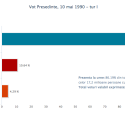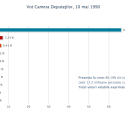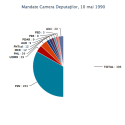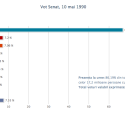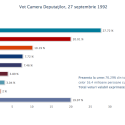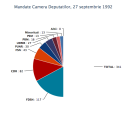Justice Minister Mona Pivniceru announced the proposals of the General Prosecutor’s Office and for the Chief of the DNA. After a long and careful selection procedure, which involved the analysis of the record of the candidates, as well as the careful evaluation of the management plans the candidates proposed, the Justice Minister, with the help of experts from the General Prosecutor’s Office, the DNA and the National Institute of Magistracy announced the two nominations for the leading prosecutorial positions in the Judiciary.
As government representatives have repeatedly emphasized, the nomination procedures and the examination of the candidates by a commission represents the solution the Government has adopted in order to ensure its compliance with the European Commission’s requests regarding the Judiciary. The Government had to resort to this procedure of interviewing the candidates and examining the policies they proposed because, in light of Romania’s European partners’ recommendations concerning the Judiciary, the Government considered that the laws pertaining to these nominations should not be amended before the general elections. It is the position of the Government that the nominations should be made by the Supreme Council of Magistracy and the next parliamentary majority of the USL will strive to ensure that politicians are no longer involved in the designation procedure of the top prosecutorial positions.
Tiberiu Nitu is the Minister’s nomination for the position of Romania’s General Prosecutor. Between 2008 and 2011, Nitu had served as the deputy of former General Prosecutor, Codruta Kovesi. Nitu has a solid career in the judiciary, having served as a prosecutor for no less than 17 years and has a consistent track record in combating corruption.
Ioan Irimie is the Minister’s proposal as the chief of DNA. Irimie has served as a chief prosecutor in several high profile cases and has worked in the most important prosecutorial institutions of Romania, including the DNA.
The next procedural steps involve the approval of the Supreme Council of Magistracy and their enactment by President Traian Basescu.
Public opinion polls confirm the USL is set to win the general elections
A 17-25 October Avangarde public opinion poll puts the USL at 60% of the votes. The main competitor of the Union, the ARD (the right-wing alliance that groups the president’s supporters and allies) lies still below the 20% psychological threshold, at 19%. The third most important political force is the People’s Party, a populist actor, which should garner 11% of the vote.
Crin Antonescu, the co-president of the USL remains the most obvious choice for the presidential office. 35% of the respondents would vote for Antonescu, whereas only 15% of the voters would support former PM Mihai Razvan Ungureanu, an associate of the incumbent president who is rumored to be one of the most prominent names considered by Traian Basescu as his successor. The poll also shows that if Traian Basescu were to be allowed to run for a third term, only 11% of the Romanians would vote for him.
Analysts and journalists have argued that even though the Romanian electoral system remains proportional, the USL is set to win more than 60% of the seats in Parliament, because in numerous electoral districts the USL candidates stand to win absolute majorities.



